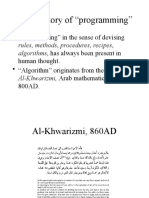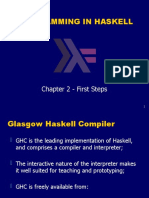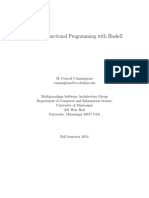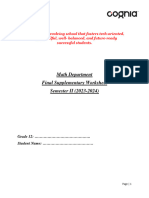100% found this document useful (1 vote)
64 views49 pagesWriting Fast Haskell
The document discusses techniques for writing fast Haskell code, including:
- Understanding GHC's compilation pipeline and Core intermediate representation
- Using primitive, unlifted, and boxed types for performance
- Forcing strict evaluation using seq, bang patterns, and strictness annotations
- Specializing and inlining functions
- Avoiding space leaks by using constant-size accumulators
- Controlling memory layout with UNPACK pragmas
- Transforming functions to continuation-passing style
Uploaded by
JohnCopyright
© © All Rights Reserved
We take content rights seriously. If you suspect this is your content, claim it here.
Available Formats
Download as PDF, TXT or read online on Scribd
100% found this document useful (1 vote)
64 views49 pagesWriting Fast Haskell
The document discusses techniques for writing fast Haskell code, including:
- Understanding GHC's compilation pipeline and Core intermediate representation
- Using primitive, unlifted, and boxed types for performance
- Forcing strict evaluation using seq, bang patterns, and strictness annotations
- Specializing and inlining functions
- Avoiding space leaks by using constant-size accumulators
- Controlling memory layout with UNPACK pragmas
- Transforming functions to continuation-passing style
Uploaded by
JohnCopyright
© © All Rights Reserved
We take content rights seriously. If you suspect this is your content, claim it here.
Available Formats
Download as PDF, TXT or read online on Scribd
/ 49



















































































